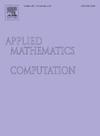自定义跟踪性能的无奇点自适应事件触发容错控制
IF 3.5
2区 数学
Q1 MATHEMATICS, APPLIED
引用次数: 0
摘要
针对执行器故障未知的四旋翼无人机,在命令滤波反步控制(CFBC)框架下,提出了一种具有自定义跟踪性能的无奇异定时自适应区间型2型模糊容错控制方案。首先,将双曲正切函数与区间2型模糊逻辑系统(it2fls)相结合,处理未知的非线性表达式,有效地避免了现有固定时间控制方案中存在的潜在奇异性问题;采用改进的CFBC技术,克服了经典递归设计过程中暴露的“复杂性爆炸”问题和动态面控制中存在的滤波器误差带来的负面影响。在此基础上,分别针对位置子系统和姿态子系统设计了固定时间自适应弹性控制器,并将事件触发机制引入控制器设计中,缓解了通信带宽的限制。此外,严格的分析表明,所设计的控制方案可以确保所有闭环信号都是定时有界的,并且可以将跟踪误差调节到满足用户自定义跟踪性能的残差集。最后,通过仿真结果验证了所提控制策略的有效性。本文章由计算机程序翻译,如有差异,请以英文原文为准。
Singularity-free fixed-time adaptive event-triggered fault-tolerant control for a QUAV with user-defined tracking performance
In this paper, a singularity-free fixed-time adaptive interval type-2 fuzzy fault-tolerant control scheme with user-defined tracking performance is developed for a quadrotor unmanned aerial vehicle (QUAV) with unknown actuator failures under the command-filtered backstepping control (CFBC) framework. At first, the hyperbolic tangent function and interval type-2 fuzzy logic systems (IT2FLSs) are integrated to deal with unknown nonlinear expressions, where the potential singularity problem exposed in some existing fixed-time control schemes can be effectively prevented. Using a modified CFBC technique, the matter of “explosion of complexity” exposed in the classical recursive design procedure and the negative effects caused by filter error existing in dynamic surface control are overcome. Furthermore, the fixed time adaptive resilient controllers are designed for position subsystem and attitude subsystem, separately, where the event-triggered mechanism is incorporated into controller design to relax communication bandwidth constraints. Moreover, the rigorous analysis demonstrated that the designed control scheme can ensure that all closed-loop signals are fixed-time bounded, and the tracking errors can be regulated into a residual set satisfying a user-defined tracking performance. Ultimately, the effectiveness of the proposed control strategy is validated through the simulation results.
求助全文
通过发布文献求助,成功后即可免费获取论文全文。
去求助
来源期刊
CiteScore
7.90
自引率
10.00%
发文量
755
审稿时长
36 days
期刊介绍:
Applied Mathematics and Computation addresses work at the interface between applied mathematics, numerical computation, and applications of systems – oriented ideas to the physical, biological, social, and behavioral sciences, and emphasizes papers of a computational nature focusing on new algorithms, their analysis and numerical results.
In addition to presenting research papers, Applied Mathematics and Computation publishes review articles and single–topics issues.

 求助内容:
求助内容: 应助结果提醒方式:
应助结果提醒方式:


